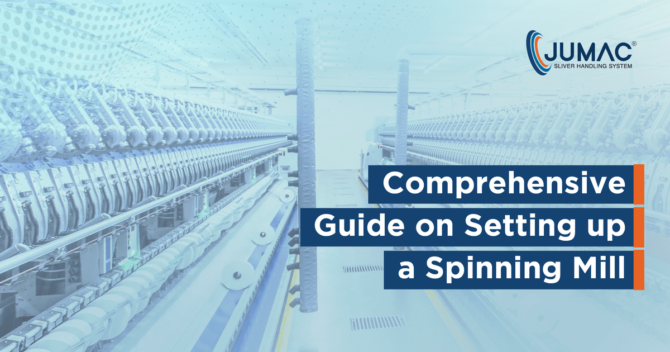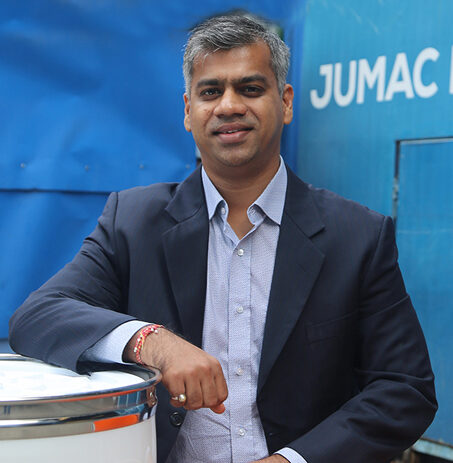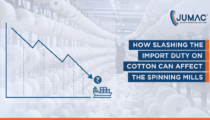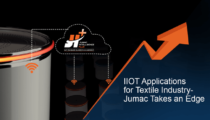This June, Jumac will be heading to Milan, to participate…

Comprehensive Guide On Setting Up A Spinning Mill
The global pandemic posed unprecedented challenges on the Indian textile & yarn sector. However, the industry is already showing strong signs of recovery – with the YoY growth in yarn spinning and exports this year expected to be around the 20% mark. In FY22, the value of textile exports from India was well over $44 billion, with cotton textiles contributing the biggest chunk. For spinning mills and manufacturers of HDPE sliver cans, these are promising times indeed.
The exponentially growing profit potential of textile spinning mills is also fueling a noticeable growth in the number of mills in the country (there are, presently, more than 3540 mills in India). However, owners have to set up and manage their mills efficiently, in order to ensure steady revenues and sustained profitability. Here is a comprehensive guideline for setting up a performance-optimised spinning mill:
Understand The Basics Of the Business
At the very outset, it is very important to get a thorough idea of the broad parameters by which spinning mills operate. Determine the type of fibres (natural or synthetic) that would be used to manufacture the end-products (i.e., yarns). Learn about the yarn spinning processes in detail – and finalise the business model of your spinning mill, as well as your target markets. You also need to zero in on the location(s) and infrastructure at your spinning mill as quickly as possible.
Start Small; Scale Up Gradually
Lack of proper planning is the underlying cause for the failure of many spinning mills across the world. That’s precisely why it is advisable to start operations on a small/moderate scale – so that funding or management does not become an issue. Set up things in a way that scaling up the mill operations in future – as demand levels grow – is never a problem. Remember, quality and timely delivery should be the biggest priorities, and your spinning mill should grow gradually. It is not a one-shot game.
Pay Attention To The Spinning Machinery & Spare Parts
Trutzschler, Saurer, Rieter AG, Marzoli, LMW – there are several reputed OEMs (original equipment manufacturers) of spinning machinery. Compare how the machines from the different suppliers work, request for quotes, and source the machinery from any of these reputed brands. Selection of yarn spinning spare parts also needs to be done carefully. Working with locally made machinery (which might be cheaper) can cause sliver damages – denting the final yarn quality.
Update Yourself With The Different Phases Of Sliver Handling
The process of using fibres to produce strong & quality-assured yarns has several stages. For end-to-end production optimisation, you need to know what these steps are all about. Right from the blow room machinery and carding process (which is often referred to as the ‘beating heart of textile spinning’), to combing, roving and drawframing – all the phases have to be carefully studied. If there are open-ended spinning processes involved, make sure they are properly set up and operated. Inadequate knowledge is a prime factor behind sub-optimal machine handling, low capacity utilisation and extended downtimes.
Also Read: The Complete Yarn Spinning Process You Need to Know
Look For HDPE Sliver Cans From A Reliable Supplier
The quality of sliver handling has a lot to do with the spinning cans used at textile mills. As a rule of thumb, you should always go for ergonomically designed sliver cans made from high-density polyethylene (HDPE) sheets, that offer excellent sliver loading capacities, superior durability and top-notch efficiency. Leading spinning can manufacturers in India, like Jumac Cans, have sliver cans of different sizes & diameters (and technical specifications) in their portfolio. These cans find application in practically all phases of spinning, and deliver great value for money.
Make Sure That There Are No Machine Compatibility Issues
When the spinning cans you select are not compatible with the machine infrastructure at your mill – production delays and downtimes are the unavoidable results. These, in turn, adversely affect the revenue-generating capacity of the spinning mill as a whole. As the mill-owner, the onus is on you to search for, and select, HDPE sliver cans that are fully compatible with all the leading machinery OEMs. There should not be any operational restrictions (affecting yarn production) on the mill floor.
Minimise Sliver Handling Imperfections
From sliver stretching and breakage, to sliver deflections, wastage, fluff accumulation & more – several types of imperfections can affect the quality of the sliver. It is vital to make a list of all such probable sliver handling risks, and find out how they can be avoided. Put in another way, the sliver handling system you set up at your spinning mill should be versatile and advanced enough to prevent sliver imperfections from becoming a point of concern.
Checking The Spinning Can Accessories Is Important Too
To maintain the stability, performance & longevity of HDPE spinning cans, as well as for keeping sliver imperfections at an arm’s length – the importance of the can accessories is immense. Select high-performance caster wheels that would ensure smooth sliver mobility, springs (box and pantograph), bottom & top covers and other parts that would boost the overall functionality of the sliver cans in particular, and the efficiency of the spinning process in general. The top manufacturers & suppliers of spinning cans typically have all requisite parts and accessories in their portfolio.
Follow The Maintenance Requirements
Even the best spinning machinery and components need regular maintenance. These can range from basic day-to-day cleaning activities, to machine resetting, adjustments, and advanced repairs & replacements (as and when required). Regularly checking the rings and spindles is also important – to ensure that the production per unit figures are maintained. For textile spinning mills, regular inspections are crucial, and there should be a dedicated preventive maintenance system in place (particularly for high-speed spinning machinery).
Be Open To Innovations
Cutting-edge technology, increased automation and product/process innovations have emerged as major drivers of the global spinning industry. To survive in the growingly competitive market and to stay ahead of the curve, mills need to embrace the latest innovations – to bring down manual dependencies, ensure greater production accuracy, and minimise lags & inefficiencies. Smart technology, in the form of mobile applications, is also paving the way for improving customer services and making things more streamlined. Multiple factors can contribute to a ‘resistance to change’ – spinning mills need to overcome this challenge to ensure sustained success.
Recommended Read: How are the Latest Innovation Fueling the Productivity of the Textile Industry
Track & Analyse Everything
Business is all about keeping track of everything, taking smart decisions, and building strong ROI (return on investment) figures. As the owner of a spinning mill, you need to analyse all relevant KPIs – including raw material prices, production volumes, machinery costs and maintenance requirements, yarn pricing & others. Greater accountability is the basis for any successful business – and spinning mills are not an exception to this.
The rapidly growing demand for quality-assured textiles, along with favourable government policies (the Production Linked Incentive Scheme (or, PLI Scheme) is a case in point) is driving the Indian textile sector forward. By embracing innovation in the form of latest spinning machinery, sourcing HPDE sliver cans & accessories from reliable manufacturers, and following agile production methodologies, spinning mills are pulling up their capacity utilisation – in their bid to meet the burgeoning demand levels. Setting up and operating a spinning mill can be hugely productive, and the pointers above should help in that regard.

Passionate about transforming the industrial sector of textile and spinning industry with innovative solutions. Director at Jumac Manufacturing, leading spinning cans and accessories manufacturer and exporter from Kolkata, India.









